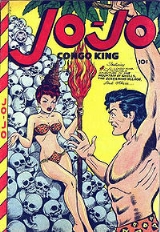
Jo-Jo, Congo King
Encyclopedia
Jo-Jo, Congo King was a fictional character
that appeared in comic books published by Fox Feature Syndicate
. Jo-Jo first appeared in Jo-Jo, Congo King #7 (July 1947).
Jo-Jo's name came from the original title of the comic series, Jo-Jo Comics. The publishers decided to change the format of the title, but kept the name for their new adventure hero. Jo-Jo was another in Fox Feature Syndicate's long line of Tarzan
copies. Like Tarzan, Jo-Jo wore a loin-cloth, lived in the jungle, and spoke a form of broken English (similar to Johnny Weismuller's version of Tarzan). Some of the episodes were given credit of Stan Ford (a pseudonym).
Jo-Jo's love interest in the first issue was Gwenna; she was replaced (never to be mentioned again) by Tanee. Both Gwenna and Tanee shared two things in common: they were scantily clad, and they spent a much of their time tied up. Because of the risque images found in the issues of Jo-Jo, many of them provided by Jack Kamen
and Matt Baker, Dr. Fredric Wertham
mentioned issue #15 in his book Seduction of the Innocent
.
The last issue of Jo-Jo, Congo King was #29 (July 1949); the title was then changed to My Desire (a romance comic). Jo-Jo reappeared in 1950, now renamed Jungle Jo. This version ran for four issues.
Fox Feature Syndicate declared bankruptcy in 1950, selling off many of its creative assets. Versions of Jo-Jo appeared in comics produced by various publishers. Star Comics reprinted several Jo-Jo stories under the name "Bombo", and Ajax Comics reprinted one story in 1954 with the character renamed "Kaza."
Fictional character
A character is the representation of a person in a narrative work of art . Derived from the ancient Greek word kharaktêr , the earliest use in English, in this sense, dates from the Restoration, although it became widely used after its appearance in Tom Jones in 1749. From this, the sense of...
that appeared in comic books published by Fox Feature Syndicate
Fox Feature Syndicate
Fox Feature Syndicate was a comic book publisher from early in the period known to fans and historians as the Golden Age of Comic Books. Founded by entrepreneur Victor S...
. Jo-Jo first appeared in Jo-Jo, Congo King #7 (July 1947).
Jo-Jo's name came from the original title of the comic series, Jo-Jo Comics. The publishers decided to change the format of the title, but kept the name for their new adventure hero. Jo-Jo was another in Fox Feature Syndicate's long line of Tarzan
Tarzan
Tarzan is a fictional character, an archetypal feral child raised in the African jungles by the Mangani "great apes"; he later experiences civilization only to largely reject it and return to the wild as a heroic adventurer...
copies. Like Tarzan, Jo-Jo wore a loin-cloth, lived in the jungle, and spoke a form of broken English (similar to Johnny Weismuller's version of Tarzan). Some of the episodes were given credit of Stan Ford (a pseudonym).
Jo-Jo's love interest in the first issue was Gwenna; she was replaced (never to be mentioned again) by Tanee. Both Gwenna and Tanee shared two things in common: they were scantily clad, and they spent a much of their time tied up. Because of the risque images found in the issues of Jo-Jo, many of them provided by Jack Kamen
Jack Kamen
Jack Kamen was an illustrator from Brooklyn, New York. His first professional job was as an assistant to a sculptor working for the Texas Centennial. He studied sculpture with Agop Agopoff and was a student of Harvey Dunn, George Brandt Bridgman and William C. McNulty...
and Matt Baker, Dr. Fredric Wertham
Fredric Wertham
Fredric Wertham was a Jewish German-American psychiatrist and crusading author who protested the purportedly harmful effects of violent imagery in mass media and comic books on the development of children. His best-known book was Seduction of the Innocent , which purported that comic books are...
mentioned issue #15 in his book Seduction of the Innocent
Seduction of the Innocent
Seduction of the Innocent is a book by German-American psychiatrist Fredric Wertham, published in 1954, that warned that comic books were a negative form of popular literature and a serious cause of juvenile delinquency. The book was a minor bestseller that created alarm in parents and galvanized...
.
The last issue of Jo-Jo, Congo King was #29 (July 1949); the title was then changed to My Desire (a romance comic). Jo-Jo reappeared in 1950, now renamed Jungle Jo. This version ran for four issues.
Fox Feature Syndicate declared bankruptcy in 1950, selling off many of its creative assets. Versions of Jo-Jo appeared in comics produced by various publishers. Star Comics reprinted several Jo-Jo stories under the name "Bombo", and Ajax Comics reprinted one story in 1954 with the character renamed "Kaza."

